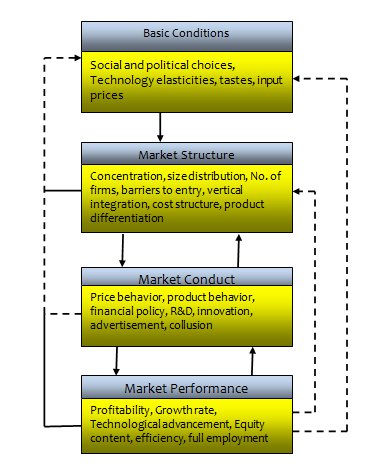The Market Structure
Introduction
Market structure refers the organizational characteristics that establish interrelationships between the buyers and sellers of a particular market. Its elements include the number and size distribution of buyers and sellers, the degree of product differentiation, the ease of entry of new firms into an industry, vertical integration and cost structure. These characteristics influence the nature of competition and pricing within that market.
Structural Parameters of the S-C-P Model

Market Concentration
Market concentration is the number and distribution of sellers and buyers within the market place
A high market concentration ratio indicates that a few traders handle a large proportion of the quantities of the good traded in the market. Measures of market concentration: Buyer concentration ratios, Seller concentration ratios, and Herfindahl indices.
Barriers to Entry
Any advantages held by existing firms over those that might potentially produce the same goods or services in a given market. They include those forces that make entry into an industry difficult, thereby limiting the number of firms in the business. Include: copyrights, patents, control of ownership of key inputs, economies of scale, differentiated product differentiation, high capital outlay, managerial know-how, market information, legal requirements & established brand names
Product or Service Differentiation
Product differentiation is said to exist when products sold within the same market are not regarded by buyers as perfect substitutes. It is brought about by perceived or real quality variation in the physical characteristics of the product, and advertising. These characteristics include shape, size, color, and packaging.
Licensed under the Creative Commons Attribution Share Alike 3.0 License
This module was developed by Moi University, Department of Economics and Agricultural Resource Management with support from OER Africa and Bill & Mellinda Gates Foundation